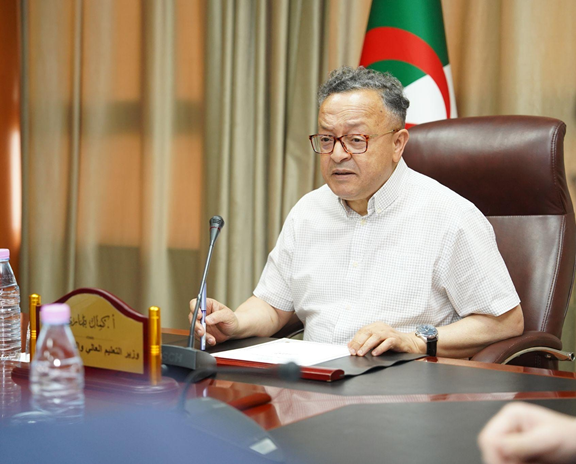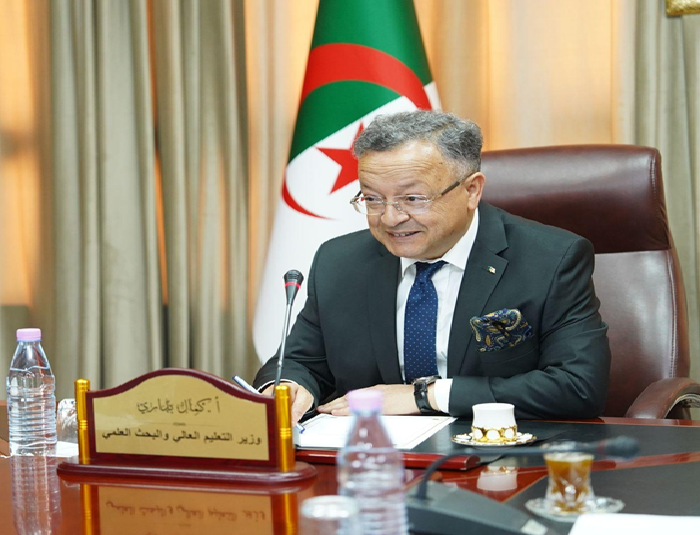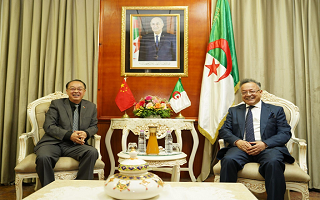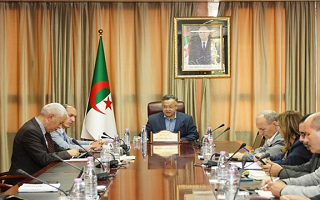On Tuesday 1 July 2025, Mr. Kamel Baddari, the Minister of Higher Education and Scientific Research, presided over the activities of the National Conference for Universities, held at the MinistryŌĆÖs headquarters. The event was attended by the directors of university institutions, ministry officials, social partners, and representatives of student organisations. All vice-rectors of university institutions also participated in the conference remotely.
In his opening speech, the minister of Higher Education presented the outcomes of the reforms undertaken in the sector and the achievements initiated over the past three years. Thanks to the concerted efforts of different university institutions, the results are beginning to be seen, such as the ŌĆ£establishment of 422 subsidiaries distributed among various university institutions, with the expectation that this number will rise to 490. This will contribute to wealth creation. Notably, 250 of these institutions have already stated their economic activities.
In the same context, Mr. Baddari confirmed that, during the period from September 2024 to June 2025, ŌĆ£117 accelerators, contributing to the establishment of student start-ups were recorded, along with 117 Entrepreneurship Development Centres that have trained 31,000 students.ŌĆØ In addition, ŌĆ£76 start-ups were launched, with expectations for this number to rise to 235 by the end of the current year.ŌĆØ
In light of these statistics, the minister stated: ŌĆ£It is anticipated that 15,205 job positions will be created by the end of the year, thus achieving a turnover of 19.67 billion dinars.ŌĆØ
In terms of education, the minister announced the ŌĆ£introduction of 14 new training programmes for the upcoming academic year,ŌĆØ as well as the expansion of higher schools for teachers and improvements of English language education:
– Enrolling 32,000 new students in the higher schools for teachers;
– Establishing 25 annexes of higher schools for teachers;
– Creating 14 new educational programmes for new literary baccalaureate holders in management technologies and modern specialisations;
– Introducing the teaching of new subjects in several courses, including artificial intelligence, software, entrepreneurship, reverse engineering, and open-source software, as well as teaching ŌĆścitizenshipŌĆÖ for the first-time of in the higher schools of the Sidi Abdellah Scientific and Technological Hub, in accordance with the PresidentŌĆÖs instructions to educate the future generations about the nationŌĆÖs ŌĆ”)
Regarding scientific research, Mr. Baddari stated that the budget for this sector has been supported by ŌĆ£an increase of 20%, with 12% allocated to new entrepreneurship and innovation formats, and a further 12 % for incubators.ŌĆØ
Regarding the valuation of innovation, he clarified that ŌĆ£564 patent projects had been submitted to the Algerian National Institute of Industrial Property, bringing the total number of applications to 3,364 requests.ŌĆØ
In another context, the minister addressed the subject of digitisation. For instance, the sector recorded 2,640,000 electronic payment transactions, and 19 digital platforms. Meanwhile, the services sector recorded 95 million meals paid for electronically during the current academic year.
Fourth-generation universities are institutions that are linked to their economic counterparts. These universities share their programmes with those of prestigious research institutions worldwide, and they are also universities at the forefront of reforms, thus contributing to the fulfilment of the governmentŌĆÖs agenda.
On this occasion, the minister emphasised the importance of launching the ŌĆ£Algerian Qualifications FrameworkŌĆØ, by creating a bridge between universities and the employment sector. He also stressed the importance of improving the visibility of the university system, which is reflected in a strategic national database, aimed at guiding students and improving their employment opportunities after graduation. This can be achieved by aligning the content of university education with the skills (degrees-certificates) and competencies required in the labour market, thus ensuring that the university degree becomes a genuine tool for economic and social integration.
following the ministerŌĆÖs intervention of and that of the central directors regarding the Algerian Qualifications Network, a Decision was signed to utilise free and open source software.
The National Conference for Universities saw the coordination of university policies, the exchange of experiences, and the discussion of opportunities in the higher education sector. It also unified the visions and directions among universities to ensure educational quality, achieve national objectives and review and develop academic programmes and curricula. This ensures that university programmes align with labour market requirements and scientific advancements.











